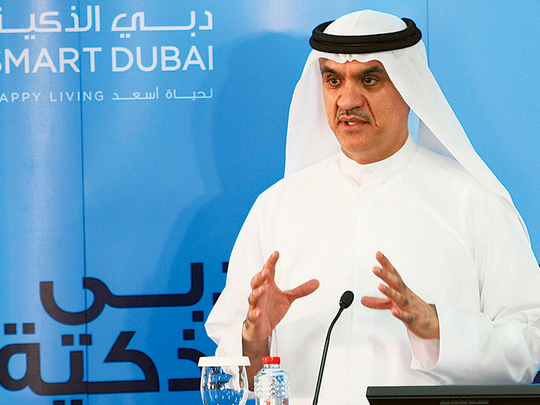
Dubai: Uniting all smart services provided by different governmental and private entities is the biggest challenge facing Dubai’s smart city transformation, experts say.
This statement was made at the sixth session of the Smart Cities Forum on Sunday, which was organised by the Mohammad Bin Rashid School of Government.
“Any private or public entity can provide smart services and become smart. The challenge is uniting these services and making Dubai smart as a whole, making it reachable with a click of a finger under one platform,” said Dr Ali Al Merri, Executive President of the Mohammad Bin Rashid School of Government.
Al Merri said the second challenge is making citizens aware of these services so that they too can become smart citizens and to get access to their feedback to provide better services.
Ahmad Julfar, Chief Executive Officer of Etisalat Group, also believes that all the services should be united for Dubai to become a smart city.
“Right now we see that every department has its own systems and smart services, which needs its own username and password. Though these services are helpful, having to go to each portal and enter a username and password does not make these services simple.”
Julfar said uniting these services and collaborating should be the next step taken by these entities.
Julfar also stressed that while technology plays a big role in the smart city transformation, it is not the driver.
“When His Highness Shaikh Mohammad Bin Rashid Al Maktoum, Vice-President and Prime Minister of the UAE and Ruler of Dubai, announced that Dubai will become a smart city, he did not talk about technology; he said we want to make people’s lives simpler. He stressed that it is not only for the people who live here, we want people visiting to experience it as soon as they set foot in the airport.”
Julfar spoke about a new initiative etisalat is working on, which is providing an application that turns mobile phones into people’s digital identity.
“A study found that people have an average of 20 passwords. You have a username and a password for Facebook, Gmail, Twitter etc … etisalat plans on introducing an application that identifies you and enables you to access all theses websites without all these passwords.”
During the Forum, Dr Luis Muñoz, Head of Network Planning and Mobile Communications at the University of Cantabria, Spain and consultant for the Spanish Government, spoke about the city of Cantabria’s transformation into a smart city.
He said smart cities are defined as services that make people happy, they are cities that can be sustainable in an easy way and cities that are innovation hubs that attracts entrepreneurs.












